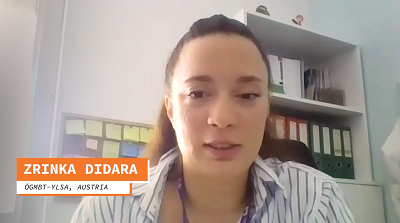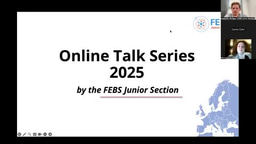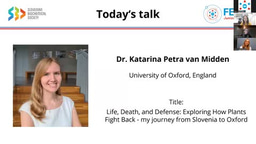ÖGMBT-YLSA – An overview


When was ÖGMBT-YLSA established?
Young Life Scientists Austria (YLSA) is part of ÖGMBT, the Austrian Association of Molecular Life Sciences and Biotechnology. It was founded in 2016 by YLSA pioneer and volunteer Jonas Ramoni, with the help of other young researchers, to bridge the gap between academia and industry. He decided to build a network of young life scientists and early-stage researchers, to support them in taking the necessary steps to build their careers via a peer-to-peer network that organizes diverse scientific and career events.
How many members do you have?
We have about 15 active volunteers for Young Life Scientists Austria from all over country. ÖGMBT has around 1200 members at the moment and 50% of them are early-stage researchers (BSc, MSc, PhDs and PostDocs). All of them are immediately welcome to take part as a volunteer or attend our events.
Do you have a specific structure?
ÖGMBT-Young Life Scientists Austria has 4 branches: East, West, South and North within Austria. Each branch has a project lead. At each branch, members meet locally – for example at social events – but there are also online meetings every 2 weeks where all volunteers meet and discuss past events and future activities, and tasks are split equally between us. These meetings have brought us together, gives us a better overview of tasks that need to be done and gives us structure.
What activities do you do?
In the last year and a half, we had a lot of online events. More specifically, in 2021 we have organized already 6 online career events (you can find some of them in our YouTube channel). These events are part of the “Life Science Career Paths” series, where we present a variety of job profiles from the life science, biotech and pharma fields, and we also have a workshop from recruiters on relevant skills for young life scientists, such as soft skills, project management skills, how to build a LinkedIn profile, etc. We have also organized several company visits over the years and we would like to keep up and refresh this tradition of events in 2022.
Additionally, we organize social events, such as regulars’ tables at each branch each month. These are a type of social and networking event, over dinner or drinks, for volunteers and interested people, where we discuss ideas and talk about YLSA.
This year we had the first ever YLSA retreat, in Salzburg, where all the volunteers connected for 3 days this summer. The event was paid or reimbursed by ÖGMBT. At the retreat we assessed and discussed the needs of young researchers in the life sciences and discussed future plans. It was a good opportunity to bring the volunteers together to meet in person, as we had only met online before that. At the event we had activities and team building tasks, which brought us together, and as we have volunteers from bachelor students to PhD to postdocs, we managed to discuss the needs of students in the life sciences at different stages, as this was the topic of the meeting: the needs of life scientists at each stage of studies, even in primary and high school.
How do you fit into ÖGMBT?
ÖGMBT and ÖGMBT-YLSA are very connected and promote each other at any given occasion. We have a representative to the general Board of ÖGMBT, who is always present at every general assembly meeting, gives a report on past activities and future plans of the ÖGMBT-YLSA, and gets input from the Board and advice on the structure of ÖGMBT-YLSA.
ÖGMBT-YLSA volunteers contribute to the main ÖGMBT annual meeting by organising a career track at the event and volunteering for the onsite management of the meeting. Also, the interim manager of the ÖGMBT is present at many of the biweekly volunteer meetings of ÖGMBT-YLSA, leads many other ÖGMBT-YLSA meetings, and gives advice on general structure and standard operating procedures (SOP).
At ÖGMBT-YLSA we use SOP to organize our events. Usually these are spreadsheets that list different tasks and steps that are necessary to organize an event. We have SOPs for our online events, to recruits new volunteers, and for social events. The steps are split by who, when and what: so who is doing the task, when the task needs to be done by, and what is the task. These tasks are shared at our biweekly volunteer meetings, to decide who is doing each task. That enables us to have well-organized events. This type of structure and organization comes from the interim manager at ÖGMBT, who has a lot of experience in organization management and event planning, which lends a professional structure to the section.
Do you have a budget?
ÖGMBT-YLSA has a budget that covers the expenses of all social and career events, including the retreat. Of course, the budget is limited but definitely enough to cover the expenses of 2 to 3 events per month. Online events, which have been more popular recently, are naturally less financially demanding. There is not a limit as such on the budget but it is expected to cover existing events.
How do you recruit more members?
We talk about our activities and initiatives at the beginning and end of each of our events, and we use the ÖGMBT databases and our monthly newsletter to share news to stakeholders. We additionally present ÖGMBT-YLSA at big lectures at a variety of universities across Austria, giving a presentation of a few minutes inviting students to join as a member or as a volunteer. The volunteers of each branch speak at the universities of their region about ÖGMBT-YLSA, so for example if there is a careers fair (especially if it is a life science or pharma event) we send our volunteers to have a look. Additionally, we ask senior researchers and other contacts, such as the representative Professors for each branch on the Board at the ÖGMBT, if we can join them at their lectures at the beginning of the course and at other big lectures of relevant subjects.
What do you think motivates students and young researchers to volunteer for the ÖGMBT-YLSA?
One main reason is the possibility to explore options within life science careers, networking with peers, and organizing and taking part in a variety of activities that promote networking, such as regular’s tables, career and scientific events. Another motivation is building networks with a variety of professional and recruiter connections in the life sciences, biotech and pharma world, which enables them to build connection for future jobs. The possibility of developing additional skills, such as project management and soft skills from organizing the events is also interesting. Our volunteers have the chance to become project leads of the events, and the feeling of accomplishment and responsibility motivates them to stay involved.
What are the ÖGMBT-YLSA aims for the FEBS Junior Section?
We want to promote engagement of young life scientists in this kind of initiative as early as possible in their career. As we have seen time and time again, our volunteers make connections by getting involved in our activities and this often leads to future job opportunities. It also builds their soft skills. The life science is a diverse and international field so, having that in mind, the FEBS Junior Section initiative tries to bring European and international junior sections together, with the aim of connecting early-stage researchers on a global level. This makes it a great initiative and we urge any younger branch of the FEBS Constituent Societies to join the FEBS Junior Section initiative!
Creating a new Junior Section?
If you are interested in creating a new Junior Section in your Society, or consolidate an existing one, we encourage you to read the posts and watch the videos from the other Junior Sections (Junior-GBM, SIB Sezione Giovani, Young NVBMB, HDBMB Young Scientists’ Forum, SEBBM Junior Consuls, and the Biochemical Society’s Early Career Advisory Panel). And if your Society already has a Junior Section, please get in touch!
Help us spread the word about the FEBS Junior Section initiative by sharing our post on Junior Sections and overview video in your country and research community. Thank you!





Join the FEBS Network today
Joining the FEBS Network’s molecular life sciences community enables you to access special content on the site, present your profile, 'follow' contributors, 'comment' on and 'like' content, post your own content, and set up a tailored email digest for updates.